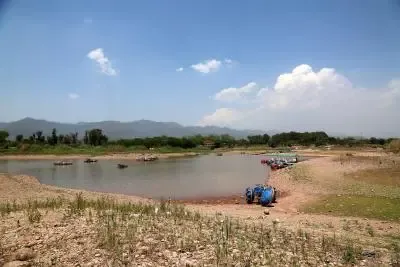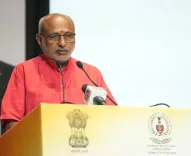What Challenges Is Pakistan Facing in Socioeconomic and Environmental Realms?

Synopsis
Key Takeaways
- Pakistan ranks 168th in the Human Development Index.
- It holds the 15th position in the Climate Risk Index 2026.
- Increasing rainfall contributes to flooding and siltation in major dams.
- Urban areas suffer from hazardous air pollution and persistent smog.
- Extreme weather events lead to substantial economic losses.
Islamabad, Nov 16 (NationPress) With a low Human Development Index (HDI) of 0.544 -- ranking 168th globally -- and a 15th-place ranking in the Climate Risk Index 2026, Pakistan persists in confronting socio-economic and environmental predicaments that successive administrations have struggled to manage effectively, a report indicated on Sunday.
These challenges are intensified by increasingly heavy rainfall in catchment areas, leading to heightened siltation in major dams, diminishing water storage capacity, and increasing flood risks.
Rising temperatures induce heat and water stress, particularly in arid and semi-arid regions, adversely affecting agricultural productivity. Concurrently, air pollution from transportation, industry, and agriculture generates smog that hampers aviation, reduces visibility, and exacerbates respiratory health issues, noted Abdul Waheed Bhutto, an expert on renewable energy, climate change mitigation, and sustainable resource management, who has contributed extensively to national and international advisory and review committees, in The Diplomat.
A report in The Diplomat stated, "The nation's limited forest cover is on a downward trend, while coastal ecosystems are threatened by saline water intrusion in the Indus Delta -- harming mangroves, fisheries, and agriculture. Rising sea levels and increased cyclonic activity further jeopardize coastal communities, while escalating disputes over water sharing, public health emergencies, and climate-induced migration underscore Pakistan's significant vulnerability."
The Indus Basin is experiencing critical stress due to over-extraction and climate change, with the National Aeronautics and Space Administration (NASA) designating it as the world’s second-most overstressed aquifer in 2015, warning that ongoing groundwater depletion could worsen regional water scarcity.
Major urban centers in Pakistan, including Lahore, Karachi, and Islamabad, continue to grapple with persistent and hazardous smog.
Economic losses stemming from extreme weather events further complicate Pakistan's crisis.
During COP27 held in Egypt in 2022, the Pakistani delegation emphasized that nations most vulnerable to climate change yet least responsible for global emissions deserve economic and technical support, as the country was still reeling from devastating floods that affected over 33 million individuals and resulted in losses exceeding $30 billion.
However, the high hopes surrounding COP27 have gradually transitioned to a more cautious and pragmatic stance, as reported in The Diplomat.
During COP28 in Dubai in 2023, Pakistan's then-Caretaker Prime Minister Anwaar-ul-Haq Kakar reiterated the country's commitment to upholding its international climate obligations.
At COP29 in Baku in 2024, Prime Minister Shehbaz Sharif again advocated for fair financing and adaptation support.
However, Pakistan at COP30 in Belem this year is represented by Punjab Chief Minister Maryam Nawaz Sharif, reflecting the growing influence of subnational leadership while indicating a shift in national priorities.
In a report in The Diplomat, Abdul Waheed Bhutto remarked, "The absence of the Prime Minister and other senior federal officials implies shifting priorities and moderated expectations, influenced by limited progress on critical issues such as finance, loss and damage, and technology transfer in previous conferences. Pakistan faces severe climate vulnerability."
"With a low Human Development Index (HDI) of 0.544 -- ranking 168th globally -- and a 15th-place ranking in the Climate Risk Index 2026, the nation continues to contend with ongoing socio-economic and environmental challenges that successive governments have struggled to address effectively. Despite these vulnerabilities, Pakistan frequently arrives at global climate summits with elevated expectations for financial and technical assistance but limited national readiness, institutional capacity, and implementation mechanisms to transform global commitments into concrete domestic outcomes," the author added.









